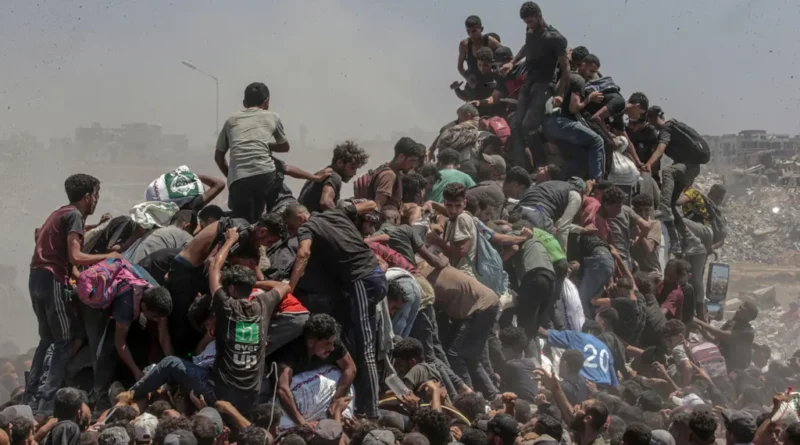Jordan & UAE Airdrop Aid to Gaza Amid Israel’s “Tactical Pause”
Jordan and the United Arab Emirates executed urgent airdrops of humanitarian supplies into Gaza on Sunday, delivering 25 tonnes of food and medicine as Israel implemented a controversial 10-hour daily “tactical pause” in military operations. The joint operation saw three successful drops while land convoys from Egypt and Jordan prepared additional deliveries through newly established aid corridors.
This fragile humanitarian arrangement comes as Gaza faces catastrophic food shortages, with the UN reporting one-third of its 2 million residents regularly skipping meals and a quarter enduring famine-like conditions. The Hamas-run health ministry claims over 100 recent deaths from malnutrition, while hundreds more have been killed in chaotic scenes at overcrowded aid distribution points.
The Israeli military announced the daily pauses would occur from 10:00-20:00 local time in three specific zones: Al-Mawasi, Deir al-Balah, and Gaza City. However, the policy’s effectiveness was immediately questioned when nine Palestinians were killed and 54 wounded by Israeli fire near a Salah al-Din Street aid route just hours after implementation. The IDF claimed troops only fired “warning shots” at approaching crowds.
BBC Verify independently confirmed an airstrike hit Gaza City’s Al-Rimal district merely one hour after the supposed ceasefire began, geolocating the attack to Midhat Al-Wahidy Street. The military denied awareness of the strike despite visual evidence and witness testimony.
“The world is watching,” stressed UK Foreign Secretary David Lammy, noting that while airdrops provide temporary relief, only unrestricted land access can sustainably address Gaza’s crisis. His comments echoed UN human rights chief Volker Türk’s plea for intensified international pressure to end the conflict, which has claimed over 59,000 Palestinian lives according to Gaza health officials.
For Gaza’s civilians, the pauses bring cautious hope mixed with skepticism. “We haven’t seen fresh produce in four months,” shared Neveen Saleh, a mother of six surviving on expired canned goods. Local journalist Imad Kudaya warned that many airdrop packages land in dangerous militarized zones, forcing civilians to risk gunfire for food.
As Jordanian and Emirati planes continued their missions, Israeli Prime Minister Benjamin Netanyahu vowed to continue military operations “until complete victory,” even while permitting the aid windows. The contradiction highlights the conflict’s tragic paradox: temporary humanitarian measures unfolding alongside relentless warfare, leaving Gaza’s civilians trapped between starvation and violence.
With the UN warning that current aid levels meet barely 15% of Gaza’s needs, the international community watches whether these tactical pauses will evolve into meaningful change—or merely punctuate an ongoing humanitarian catastrophe.
Go To Main Page

